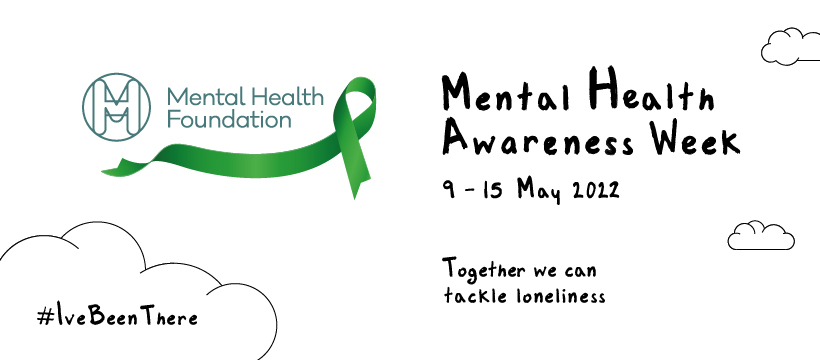Mental Health – what is it, and why is it so important?! It seems that we are hearing about mental health more and more these days, as we learn about the widespread impacts of poor mental health and continue to navigate through a pandemic.
Mental health is defined by the NHS as “a positive state of mind and body, feeling safe and able to cope, with a sense of connection with people, communities and the wider environment”1. Simply put, our mental health is the state of our emotional, behavioural, and social well-being.
When our mental health is good, we often don’t think about it. This can make it easy to miss the signs that our mental health is in decline. When our mental health is poor, it can feel like the only thing we think about, and it can have severe impacts on our lives, relationships, jobs, and self-esteem. This is why mental health needs to be explored and maintained regularly, just as we do with our physical health!
While Mental Health Awareness Week has existed in the UK for 21 years, many people only really became aware of their mental health over the past three years. A UK Government study on mental health during the pandemic showed that adults 18 and over presenting with significant psychological distress increased to a whopping 29.5% in April 2020 (up from 17% in 20142), and tapered down to (a still highly significant) 24.1% in March 20213.
For those already struggling with their mental health, the pandemic created a pressurising cocktail of isolation, fear, instability, and death, worsening their existing symptoms. For others, the pandemic was the catalyst for a sudden onset of symptoms, and many of these individuals were not equipped to manage their mental ill health. As the pandemic labours on, mental health services find themselves overwhelmed with individuals needing support, and NHS IAPT wait times are sometimes as much as 18 months.
This is why being aware of our mental health and practising preventative maintenance can be so vital. The sooner we become aware that our mental health is waning, the faster we can access supports and hopefully prevent our symptoms from worsening.
One simple thing that can be done every day to help us keep track of the state of our mental well-being is to take a few minutes to perform a ‘systems check’:
- Remove distractions and get comfortable
- Close your eyes (if you can) and focus on your breathing
- Ask yourself, how am I feeling today?
- How does my mind feel? Cluttered? Overwhelmed? Calm?
- How does my body feel? Tense? Hurting? Relaxed?
- Become aware of anything that may be impacting how you feel, physically or emotionally
- Think about anything that you could do/change to help improve any negative thoughts/feelings that may be there
- If you feel like it, jot down a little note or two in a diary so that you can keep track of your moods
- Try to do this every day and see if you notice any changes or patterns in your mental wellbeing! If you notice that your moods seem to be getting worse, it may be time to seek some support
Some signs that you are struggling emotionally may be:
- Feeling drained, exhausted, or demotivated
- Not wanting to be around others
- No longer enjoying activities that once made you happy
- Feeling distracted or struggling to focus
- Experiencing mood swings
- Crying a lot
- Feeling irritated at people without cause
- Finding it difficult to get out of bed
- Feeling overly negative, self-critical, or pessimistic
Another great way to maintain good mental health is to practice self-care. This can mean many things to different people, but self-care is the regular practice of engaging in activities that maintain and support positive well-being. Self-care can be:
- Exercising
- Getting enough sleep
- Eating well
- Seeing friends/family/loved ones
- Reading
- Crafting
- Playing sports
- Having a bath
- Getting a massage
- Going for a walk
- Drawing/painting
- Trying a new hobby
- Watching your favourite series
- Looking at funny animals videos until you laugh
- Having a cup of your favourite tea…..
…..anything that brings you joy, peace, contentment, and a feeling of positive well-being counts! Trying to engage in a self-care routine at a minimum of once per week, but ideally every day, is good practice.
Some activities that may seem to be self-care but are actually detrimental are:
- Using alcohol or drugs to lift your mood
- Gambling
- Excessive partying
- Overspending
- Excessive social isolation….
…so beware of these activities! They may feel nice in the short-term, but long-term they will be working against you.
By being aware of our own mental health and practising preventative care, we know when things are going wrong and when it is time to reach out and seek help. If you feel you are struggling, speak to your GP, your manager, a trusted friend/family member, or your EAP team. Try not to feel embarrassed or ashamed! Mental health problems can happen to anyone, and just as a broken bone is not a sign of weakness, neither is poor mental health.
This Mental Health Awareness Week, try to take stock of your moods and practice a new self-care routine. Remember – mental health awareness is important this week and every week!
Elise DeFusco, Counsellor, DPsych
- https://www.england.nhs.uk/blog/geraldine-strathdee-8/#:~:text=The%20definition%20of%20mental%20health,communities%20and%20the%20wider%20environment.
- https://digital.nhs.uk/data-and-information/publications/statistical/adult-psychiatric-morbidity-survey/adult-psychiatric-morbidity-survey-survey-of-mental-health-and-wellbeing-england-2014
- https://www.gov.uk/government/publications/covid-19-mental-health-and-wellbeing-surveillance-report/2-important-findings-so-far






